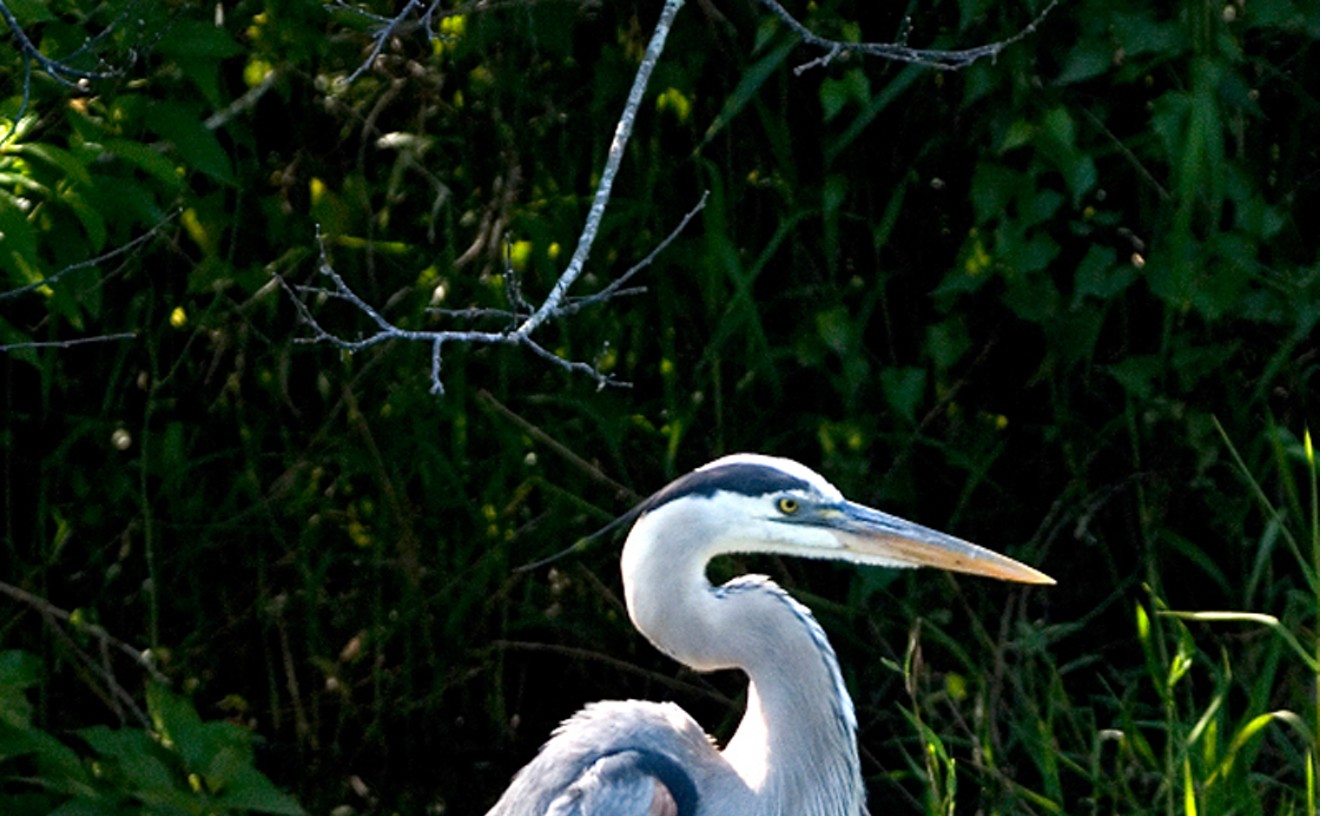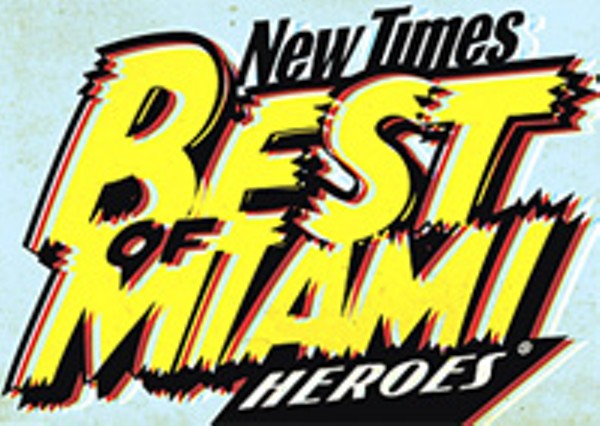Best Young Environmentalists
Aspira
The Aspira Association is a national nonprofit dedicated to the education and leadership development of Puerto Rican (and other Latin) kids. Since 1961 the group has created programs to teach reading, math, and science; and increase educational resources, health, highway safety, and professional acumen. It's worked in the areas of language, economic development, arts, and culture, and has created a network of information centers and tangential organizations such as APEX (Aspira Parents for Excellence). All wonderful stuff. But worthy of special recognition are the group's recycling efforts, specifically Working Together for a Healthy Environment, a collaboration in early 2006 with Miami Dade College. Aspira also joined Keep North Miami Beautiful, an anti-litter initiative. Aspira is inspiring.
Best Miami Spokesman
Don Shula
When the South Florida Super Bowl XLI Host Committee needed a public face, its members didn't tap Gloria Estefan, Miami Mayor Manny Diaz, or rapper Rick Ross. Instead they went with the granite jaw, the legend: former Dolphins head coach Don Shula. The man is an icon in this city. For more than 30 years he manned the sidelines for the city's storied sports franchise, engineering a perfect season in 1972. But Shula is more than just a football coach. He is a man of great honor and integrity who still hasn't abandoned his down-to-earth-by-way-of-Cleveland persona. You're just as likely to run into him eating a slice at Gino's Pizza on Washington Avenue as you are at the United Way annual ball. And the 77-year-old steakhouse and hotel entrepreneur doesn't pull any punches, as evidenced by his stinging rebuke of recently departed Fins coach Nick Saban. Now if only someone could convince Shula to run for county mayor in 2008. Then maybe we could really have an inspiring leader.
Best Rural Bike Ride
Long Pine Key

Rodney Cammauf / National Park Service
After entering Everglades National Park through the Homestead entrance, Long Pine Key is pretty much the first stop in. It offers a maze of bike paths, ranging from 20-minute joy rides to half-day adventures. Between the Royal Palm Vistor Center and Pine Glades Lake is a mesh of trails that take you through sawgrass prairie, old farmland, and pineland. One of the longest rides is down Old Ingraham Highway, an abandoned, overgrown road that goes some ten miles out into the Glades and feels like a journey into Jurassic Park. Although it's possible to take a road bike out on these trails, a mountain bike is strongly recommended — as is a spare tube. Entrance to Everglades National Park is $10 per car (good for seven days), or $5 if you come by bike. An annual pass costs $25.
- 40001 State Road 9336, Homestead, 33034 Map
- 305-242-7700
- www.nps.gov/ever
Best Citizen
Bill Swink
For more than twenty years, Bill Swink has been known among Coconut Grove's homeless population as the "Soup and Sandwich Man." He serves food every Friday afternoon (around 2:00) at the Dinner Key Marina docks by the shrimp boats (3400 Pan American Dr., Miami). He drives up in his white car, pops open the trunk, and sets up his portable soup kitchen. "He is beloved in the Grove," says one anonymous Grovite. "He does not have to do this. Everyone else tries to push us out, but Bill really cares." "You have to survive out here, and I love helping people," says Bill, who works as a lawyer by day, "but I'm a small piece of the puzzle. The ladies at [St. Raymond's Catholic Church] cook the food. The quality is so good because they pay for most of it out of their own pockets." He continues, "There are homeless people in the Grove, but there are pockets of homeless people all over Miami. If people who read this could get motivated in their communities, it would be easy to replicate what I am doing." Bill stops for a second and takes off his glasses. "Publix donates the pastries and fruits; other stores donate food. It really becomes a labor of love."Indeed the soup and sandwiches are always delicious. There are also pastries, fruit, and beverages. When the food is eaten the group cleans up the area and loads the table and coolers back into Bill's car. "Everyone talks about this homeless problem, but Bill makes a real difference," says one woman who lives on a boat. "It is not that hard to treat other people like human beings, with respect. That could easily be you begging for spare change."
Best Road Race for Cyclists
SMART Ride
Two days, 165 miles, some of the most breathtaking views Florida has to offer. Celebrating its fourth year, the SMART ride — the southernmost HIV/AIDS ride — though not technically a race, attracts hundreds of particpants annually. Approximately 500 cyclists gathered this past March 30 at the starting line in Pinecrest. Each paid a $75 entrance fee and raised at least an additional $1200 to compete. Their combined efforts raised more than $1 million, which was donated to six area AIDS-related charities. And though the event doesn't offer a medal for first place or a purse for the fastest time, riders get to test their physical limitations for a much-needed cause. The ride is fully supported, meaning there are manned rest stops along the way with food and drinks, and a support team that trails the group, providing technical assistance to those in need and picking up stragglers who may be unable to complete the course. Those who do make it to the finish line in Key West are invited to a catered party in their honor on Duval Street.
Best Heat Player
Jason Kapono
With D-Wade brought low by injury — and only recently returned — this honor must now go to a mere mortal. Jason Kapono is most definitely human, flawed by his slow feet and inability to fly. But the 6'8" swingman possesses a laudable knack for pouncing on loose balls, plus an unselfish impulse for making the extra pass. He's a dexterous ball-handler and fearless shooter, and ranks among the league's best in three-point shooting percentage — winning the NBA All-Star Weekend's three-point competition was no accident. With his superstar teammates, Kapono has formed a symbiotic relationship: By forcing defenders to come out to defend him, Kapono saves Shaq from double teams and opens up space for Wade to go soaring into the lane. Plus, on a team full of past-their-prime, erstwhile All-Stars (Antoine Walker, Gary Payton, Alonzo Mourning, Eddie Jones, and, yes, Shaq), it's nice to have a goofy white guy hustling back on D like he's lucky to be in the league.
Best Herald Writer
David Ovalle
Working the cops beat in Miami-Dade is an inherently sensational experience with no lack of dramatic narratives, but David Ovalle has found a way of lingering after the rest of the media circus has taken down its tents. His assailants and victims are people Herald readers remember. To cover the story of Maria Pacheco, an illegal immigrant whose baby was found dead in a portable toilet at a South Miami-Dade plant nursery, Ovalle vividly described the destitute Guatemalan town that she had left. He related to readers the misery of Edward Quetel, who held his wife Chermaine as she died of gunshot wounds, murdered by an unknown assailant while both were working a shift as Metrorail guards. There was the pigeon trapper whose business once landed him on the pages of the Wall Street Journal, years before he became a crack cocaine addict, and then a murder victim. And then there were occasional moments of dark humor: the college student armed with an AK-47 who was shot in the buttocks by confused police as he chased a burglar. Or "Man Shot, Drives through Fence into Rabbit Cage," in which Ovalle concluded that "It was unclear if any bunnies were also victims in the crash." In sum, his byline is a seal of quality, and — did we mention that he apparently possesses unfailing energyç — it is in the paper pretty much every day.
Best Magic City Icon
Miami Herald headquarters
One Herald Plaza is among the ugliest buildings we have ever seen. This hulking, squat, cube-shape structure reminds us of the Borg's spaceship. Inside you will find journalists stripped of their free will objectively describing what their Borg masters (a.k.a. the McClatchy Co.) tell them to report on. Construction began in 1960 and the Herald officially moved in on March 23-24, 1963, without missing an edition. For better or worse, the bayside HQ has also become a symbol of Miami's angst, thanks to events such as Jose Varela's brazen takeover of One Herald Plaza and Arthur Teele's suicide in the building's lobby in 2005. The sad part is that one day, we will bid farewell to the newspaper's 43-year-old home so we can have more — whoopee — condos. The Miami City Commission has given developer-lawyer Pedro Martin the green light to build up to three high-rises and a massive shopping center on property abutting One Herald Plaza. Martin also has first dibs on redevelopment of the HQ site, where he wants to erect a 60-plus-story tower.
- 3511 NW 91st Ave., Doral, 33172 Map
- 305-350-2111
- miamiherald.com
Best Marlins Player
Hanley Ramirez
For any Marlins fan who remembers the 2003 World Series and the insanely good pitching that won it, the name Josh Beckett should be honored. Enshrined. Hell, can we apply for sainthoodç Alas, Beckett was traded away to the Red Sox and left some mighty big cleats to fill. One of the players who came here in return for Beckett, through a complicated trade deal, was shortstop Hanley Ramirez. No, not Harley Ramirez. No, not Manny Ramirez. No, not that serial killer. We mean the kid who came out of Beantown's farm system to begin his major league career with the Marlins, under the weight of great expectations. He carried the load and then some. In fact, Ramirez won the National League Rookie of the Year in 2006 (notably, his Marlins teammates Dan Uggla and Josh Johnson were right behind him in votes). It's not just that Ramirez has a .292 batting average, or that he regularly slams homers over the wall, or that he steals bases almost every third game (51 last year!). It's that, bundled together in a speedy package, with his hat cocked sideways on his head and his sunglasses coolly in place, Ramirez (lovingly nicknamed "Shadez") gives us something exciting to watch and someone worthwhile to cheer for. It's too early to guess whether the 2007 Marlins will make the postseason, and it'd be premature to call Ramirez our next Josh Beckett — but hey, you're not calling him Harley anymore.
Best Career Move
Anders Gyllenhaal
Anders Gyllenhaal spent twelve years as a reporter and editor at the Miami Herald before leaving to work at papers in North Carolina and Minnesota, where he was editor. In December the Herald's parent company, the McClatchy Co., announced that Gyllenhaal would be returning to Miami to replace longtime editor Tom Fiedler, who was retiring. We think this is an excellent move for Gyllenhaal, a lifelong newshound. After all, the stories in Miami are much more exciting than those in — whattaya call itç — Miny-soda.





